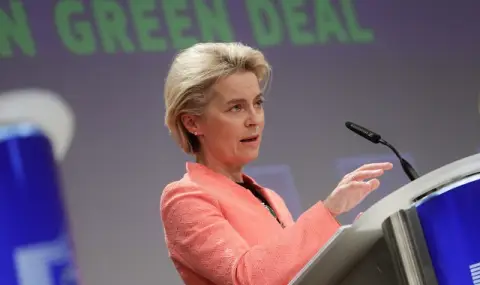European Union (EU) leaders on Monday evening failed to support Ursula von der Leyen for another term as president of the European Commission, Politico reports, citing three diplomatic sources.
That did not happen, despite assurances from French President Emmanuel Macron and German Chancellor Olaf Scholz in recent days that they were close to a deal.
"There is no agreement tonight," European Council President Charles Michel told reporters late Monday night after the leaders' dinner.
Leaders will continue discussions at a later date, possibly at their next meeting on June 27-28.
We recall that after the European elections, an early consensus emerged around von der Leyen from Germany for a second term as President of the European Commission, Antonio Costa from Portugal as President of the European Council, Roberta Mezzola from Malta as Head of the European Parliament and Kaia Callas from Estonia as foreign minister.
Expectations were high when the 27 heads of state and government met in Brussels in the hope of sharing the bloc's top four jobs between the current coalition of the centre-right European People's Party, socialists and liberals.
After Macron's party was defeated by the far-right in the election, his decision to dissolve the French parliament and call early elections appears to have accelerated discussions for top posts. Negotiations usually take weeks.
In recent weeks, other European leaders have also stressed the need for continuity given Russia's war in Ukraine and the potential return of former US President Donald Trump.
But hopes of a quick deal evaporated on Monday night as the European People's Party, the winner of the European Parliament election, demanded more concessions and more power among top posts. As expected, the EPP wanted to reappoint von der Leyen and Mezzola, both of whom belong to the political family. In addition, the EPP proposed to the Socialists that the mandate of the President of the European Council be divided into two parts of 2.5 years - and the EPP will receive one of them.
This in turn irritated the socialists and democrats who hoped to win the post for Košta. Soon after the negotiations ended, the accusations began.
"It was partly hubris on the part of the EPP, an EU official said. By asking for a term of only 2.5 years, this created a huge perception problem for socialists who would be put in a difficult position. The EPP did not play this well. This will be difficult to solve."
The employee added that Michel was not helpful in the discussions.
"Instead of helping to find a deal, he kept bringing up other things," the official said.
Another reason the talks broke down is that Italian Prime Minister Giorgia Meloni was unhappy with how the evening unfolded, several EU diplomats said. Meloni, who was one of the few leaders to emerge from the European elections with an electoral victory, was unhappy with attempts by other EU leaders to exclude her from the negotiations.
The Italian prime minister "disputed the type of approach to the discussion," said an official familiar with the discussion. She started "from the assumption that today's informal meeting was to be the moment to discuss what to do in the light of the signals from the European elections and then, from that starting point, to start the discussion on the names for the top positions. and not the other way around," the official added.
